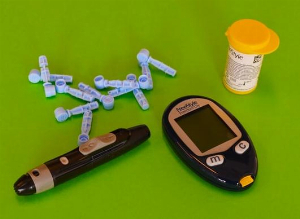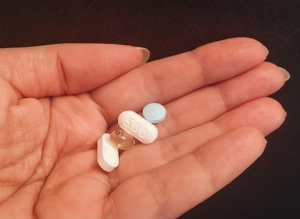Diabetes and sexual health: Is there a link?
Published 7 Aug 2023 • By Polina Kochetkova
The relationship between diabetes and sexual health can be very tricky. This condition can cause many additional issues, yet sexual problems are often overlooked or simply not discussed openly. Diabetes, especially type 2 diabetes, can cause many disturbances in your intimate life. Today we investigate possible sexual issues related to diabetes and ways to cope with such disturbances.
How does diabetes affect male and female sexual health? Why is it important to discuss sexual troubles with your doctor? And how to cope with negative side effects on your sexuality?
Discover in this article!

Millions of individuals throughout the world suffer from the chronic disease of diabetes. Although insulin has a well-known effect on blood sugar levels and general health, its connection to sexual health is frequently disregarded or misunderstood. Understanding the relationship between diabetes and sexual function is essential for comprehensive treatment and general well-being. Sexual function can be significantly impacted by diabetes in both men and women.
Problems that arise at any stage of the sexual response cycle, which includes desire, arousal, orgasm, and conclusion, are referred to as sexual dysfunctions. Although the specific concerns may vary across the sexes, both men and women with diabetes might encounter sexual problems.
How does diabetes affect male sexual health?
Erectile dysfunction (ED) is among the most prevalent sexual issues that men with diabetes experience. When a man has trouble getting or keeping an erection strong enough for sexual activity, it is called erectile dysfunction. According to studies, men with diabetes are two to three times more likely than men without diabetes to have ED.
The blood arteries and nerves that supply the penis can be damaged, which is frequently the underlying cause of ED in diabetics. Diabetic neuropathy, a disorder that affects neuron function, particularly those essential for arousal, can be brought on by high blood sugar levels. Diabetes can also harm the endothelium, which lines the inside of blood vessels, decreasing blood flow to the penis.
Men may also have problems with retrograde ejaculation as a result of type 2 diabetes complications. It happens when semen escapes into the bladder rather than from the penis.
Poorly functioning internal sphincter muscles are at the root of this problem. These muscles are in charge of opening and closing bodily passageways. Retrograde ejaculation can be brought on by abnormally high glucose levels that harm the sphincter muscles' nervous systems.
How does diabetes affect female sexual health?
Although the impact is not as widely researched as it is in men, women with diabetes can also have sexual issues. Reduced sex desire, arousal difficulties, and difficulty achieving orgasm are a few frequent problems. Similar to men, women may experience these symptoms as a result of vascular abnormalities and nerve damage brought on by diabetes.
Diabetes can also alter vaginal lubrication, which can cause pain or discomfort during sexual activity. Women with poorly managed diabetes may experience more vaginal infections, which can further harm their sexual health and general health.
Why is it important to talk to your doctor about the effects of diabetes on sexual health?
Often patients feel uncomfortable or awkward talking about their sexual issues. According to a study published in Diabetes Care, approximately half of all diabetic men and 19% of diabetic women are willing to bring up the subject to their doctor. It is important to know that you can discuss sexual health-related issues, possibly caused by diabetes, during medical appointments with no shame. Sexual dysfunction may indicate a disease's development or an ineffective course of treatment.
In order to lessen the effects of diabetes on sexual function, proper diabetes control is essential. This includes ensuring that blood sugar levels are kept within safe ranges through treatment, nutrition, exercise, and routine monitoring. Developing a thorough treatment plan can be facilitated by close collaboration with medical professionals including endocrinologists and diabetes professionals.
The negative effects of several medications used to treat diabetes or its consequences can sometimes have an impact on sexual function. It is crucial to talk to a healthcare provider if sexual problems develop after starting new medicines. It may be possible to change the types or quantities of medications in order to enhance sexual function without affecting diabetes management.
What can be done additionally to lessen the effects of diabetes on sexual health?
Lifestyle Changes
Living a healthy lifestyle can help you manage your diabetes and maintain good sexual health. Regular exercise helps enhance cardiovascular health and blood flow, which is good for sexual performance. Better diabetes control and higher self-esteem can both be facilitated by a balanced diet and weight management.
Exercises for the Pelvic Floor
Kegel exercises for the pelvic floor can help men and women build stronger pelvic floor muscles. These exercises can help with problems like urine incontinence, which may be more prevalent in diabetics, and can also improve sexual performance.
Psychological Support
It's crucial to address the psychological components of sexual dysfunction. Sex therapy or couples counseling can help with sexual troubles by enhancing communication, lowering anxiety, and offering coping mechanisms.
Key takeaway
It is true that diabetes can affect both men's and women's sexual health, frequently due to physiological and psychological causes. But it's important to understand that these difficulties must be properly handled.
A thorough approach to managing diabetes and open communication with partners and healthcare professionals can greatly enhance sexual function and general quality of life. Remember that the first step to recovering confidence and engaging in happy sexual encounters while managing diabetes is to ask for medical guidance and support.
Give it a "Like" and share your thoughts and questions with the community in the comments below!
Take care!
Comments
You will also like

Diabetes: Discrimination, Professional Life, Plan Ahead... What do patients say?
9 Nov 2018 • 13 comments

 Facebook
Facebook Twitter
Twitter

